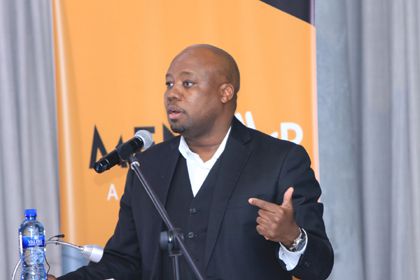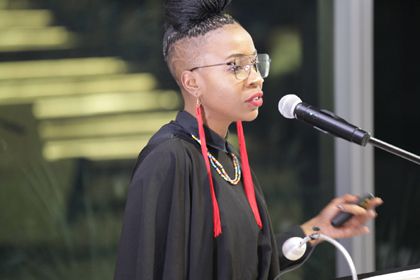What does masculinity mean in the world today? Isn’t it time to replace outdated constructs expressed by phrases such as "boys will be boys" and "men behaving badly" with a new, healthier concept of masculinity?
Sydney Mbhele and Mpho Masondo, the co-founders of Mentor a Boy Child believe so.

Syndey Mbhele, co-founder of Mentor a Boy Child. Photo credit: Dala-Indyebo-Projects

Gugu Nkabinde, advisory board member of Mentor a Boy Child. Photo credit: Dala-Indyebo-Projects
Mentor a Boy Child is an NPO/PBO and section 18s organisation which was founded two years ago. They are launching a new 18-month pilot programme for boys aged between 14 and 15 years to coincide with youth month 2019.
The programme, which will be piloted at a school in an historically disadvantaged area and will reach 100 youngsters, will offer access to structured mentorship through a series of quarterly workshops. These workshops, which will include inspirational talks, curriculum-driven working sessions, one-on-one mentorship sessions and feedback sessions, are intended to uplift, upskill and empower boys currently in Grade Nine to be the very best men they can be in today’s fast-moving, complex technological society often ridden with social ills.
“We believe that the development of the boy child has been neglected and that we need to give boys the active support they require in order to navigate the transition to adulthood and to define themselves as a new kind of man,” says Mbhele, who when he is not chairing the board of Mentor A Boy Child, is the Chief Executive: Brand for one of the big financial services organisations, he is an experienced marketer and serves on the board of the Marketing Association of South Africa. “Our aim with this programme is therefore to help adolescent boys make better life decisions and be better men in society.”
With social dysfunction both within and outside the home being disturbingly prevalent in South Africa, boys need active guidance and positive role models at this critical time in their lives if they are to become empowered and engaged men who are able to make a positive contribution to society.
“Our aim is to deliver effective and fit-for-purpose role modelling and life skills development to replace outdated and often destructive concepts of masculinity,” says Andile Khumalo, who is also board member of the Mentor a Boy Child and is Chairman of the Brave Group, a full-service marketing agency. “The combined effects of poor education, the absence of father figures, and the lack of character-building programmes and other appropriate extra-curricular activities means that boys in this age group often feel aimless and without a purpose in life. We intend to help them to find their purpose and to become a new kind of man.”
The pilot programme will focus on five key attributes, namely responsibility, self-empowerment, leadership, social contribution and personal fulfilment. This is an expression of Mentor a Boy Child’s mission, which is to provide guidance and support to build healthy masculinity, to be a beacon of hope for boy children, to encourage them to take ownership of their own development and futures, and to enable them to become healthy and effective leaders in society.

Top row L-R: Gavin Weale, Gugu Nkabinde, Phafogang Secondary School pupils and teacher Jennifer Khonkhe, Sydney Mbhele, Andile Khumalo, Mpho Masondo & Monwabisi Thethe. Photo credit: Dala-Indyebo-Projects
The workshop format is intended to establish a safe, supportive and effective process for making contact and establishing relationships with good role models, primarily men. Each boy will be matched with a suitable mentor who will help him to develop a range of life skills applicable in both the workplace and in family and social relationships. In time, e-learning modules will be added to the programme and an MABC app will be made available to participants.
“The pilot programme will give us the opportunity to test the concept and to refine it if necessary,” says Khumalo. “Thereafter, our intention is to begin rolling it out to a diverse range of schools in an organic and manageable way. We hope this will be the start of something truly useful and inspiring, and that our graduates will enter society as empowered and enabled men behaving wonderfully.”
